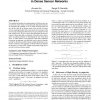Free Online Productivity Tools
i2Speak
i2Symbol
i2OCR
iTex2Img
iWeb2Print
iWeb2Shot
i2Type
iPdf2Split
iPdf2Merge
i2Bopomofo
i2Arabic
i2Style
i2Image
i2PDF
iLatex2Rtf
Sci2ools
161
click to vote
WSNA
2003
ACM
2003
ACM
Asymptotically optimal time synchronization in dense sensor networks
We consider the problem of synchronization of all clocks in a sensor network, in the regime of asymptotically high node densities. We formulate this problem as one in which all clocks must line up with the clock of an arbitrary node in the network (of course without assuming that this clock can be observed everywhere in the network, nor assuming that this node has any special hardware–this node could be any). We give a state-space description for the generation of observable data as a function of the ideal clock, and we derive an optimal estimator for determining the state of the ideal clock. A salient feature of our approach is that nodes collaborate to generate an aggregate waveform that can be observed simultaneously by all nodes, and that contains enough information to synchronize all clocks. This aggregate waveform effectively simulates the presence of a “super-node” capable of generating a high-power, network-wide time reference signal. Categories and Subject Descriptors C...
Aggregate Waveform | Clock | Node | Sensor Networks | WSNA 2003 |
Related Content
| Added | 05 Jul 2010 |
| Updated | 05 Jul 2010 |
| Type | Conference |
| Year | 2003 |
| Where | WSNA |
| Authors | An-Swol Hu, Sergio D. Servetto |
Comments (0)

